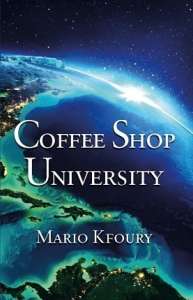
Mario Kfoury’s debut work of nonfiction, Coffee Shop University, is a thought-provoking exploration of spiritual, philosophical, and intellectual self-discovery.
Divided into three parts, the book chronicles the arrival of the author in the U.S. in 1987 from war-torn Lebanon. Settling in Los Angeles, he and his friend, Elrob, quickly embraced the bodybuilding culture of southern California while working as security officers. It’s during this time that Kfoury attended a meeting of Native Americans where he was introduced to a spiritual smudging ceremony, which subsequently inspired him to read extensively on Hinduism, Buddhism and Taoism, among others.
The second part of the book begins ten years later, in Daytona Beach, Florida, where Kfoury has moved in order to earn his commercial pilot’s license. He spends time at Deland Skydive Center where he becomes aware of a young woman who he later encounters at the Barnes and Noble that he frequents, and the two quickly immerse themselves in a diverse and complex discussion on psychology, religion, and even love.
Part three of the book covers Kfoury’s return to L.A., reconnecting with his friend, Elrob. Kfoury’s interests are now turning to finance since making a “small fortune” through investments in gold and oil. He is counseled by a stranger called Pythagoras who counsels him that one has to balance between the markets and one’s personal life; that everything in life is “Karma, fractals and proportionality.” This amounts to one of the core tenets of the book.
Throughout these three seemingly disparate parts, there is an enduring thread of self-realization and actualization through the potentially mundane work of investment, or even the daily rituals of everyday life. What Kfoury learns through a series of mentors is that all facets of life have a spiritual component – all of life can be, and should be, imbued with deep meaning. The book reads like Kfoury’s own self-help journey, but with a much deeper intellectual rigor than you’ll find in much self-help fare, and casting a wider net of ideas and philosophies.
Kfoury exposes the reader to some heavy-hitting topics like the Ostrich Syndrome, systems like the Dow Theory and Ichimoku, and Newton’s Third Law of Motion. These are all fascinating ideas, but herein also lies the biggest challenge with the book, as the breadth of ideas is perhaps broad to a fault. At less than 200 pages, Coffee Shop University is brimming with theories and revelations, but complex theories are sometimes given only a passing mention, affecting the book’s overall cohesion.
That said, as a jumping off point for learning more about the ideas he discusses, there is much to be gleaned from these pages. The very fact that he is tackling so many big ideas is inspiring in itself, as his knowledge covers so many wings of intellectual thought. While the exploration of these ideas is not entirely exhaustive, Kfoury is doubtlessly an intelligent and ambitious writer and thinker, and this alone gives the book a sense of authority. As a result, the book will aid the reader to approach life with more vigor – both towards these intellectual ideas, and to every facet of everyday life.
On the whole, Coffee Shop University succeeds in encouraging readers to think outside the limits of known acceptance and to embrace complex and invigorating ideas and theories. It could be twice as long, or more, but what’s here is an exhilarating compendium of ideas about philosophy, morality, religion, economics, science, and more.
Links
Book Site
Facebook
Twitter
Amazon
Goodreads
STAR RATING
Design
Content
Editing
Get an Editorial Review | Get Amazon Sales & Reviews | Get Edited | Get Beta Readers | Enter the SPR Book Awards | Other Marketing Services























Leave A Comment